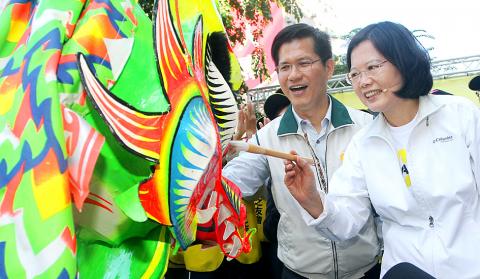The war of words between Democratic Progressive Party (DPP) Chairperson Tsai Ing-wen (蔡英文) and President Ma Ying-jeou (馬英九) got even more heated yesterday, this time turning to foreign media outlets who have characterized Tsai as Taiwan’s “Robin Hood.”
Ma over the weekend mocked comparisons between the DPP presidential candidate and the popular folk hero.
“The foreign press has described Tsai as a Robin Hood-like heroine, but to my understanding Robin Hood should fight for justice, rather than spread rumors and set up decent people,” Ma said on Saturday.

Photo: CNA
Tsai was likened to a modern-day Robin Hood mainly because of the DPP’s piggy bank fundraising drive, while some have likened her election campaign to a Jasmine Revolution-type movement.
In response to Ma’s remarks, Tsai told a campaign rally in Greater Taichung yesterday that the heroic outlaw “only appears in times of failed governance.”
“People only look forward to the emergence of a Robin Hood-like figure when a leader is failing miserably,” she said.
It is not unusual for foreign news services to pay attention to Taiwan’s presidential elections, she said, as they have been monitoring every step of Taiwan’s democratization through the years.
The reason foreign journalists chose to characterize the presidential election in terms of “Robin Hood” and the “Jasmine Revolution” probably suggests they sense the change that has taken place in the country during the election campaign, Tsai said.
The “Three Little Pigs” campaign encourages participatory democracy — voters do not just blindly cast ballots, but think about social justice and speak out if they find something needs to be done by the government before they make their choice at the ballot box, Tsai said.
The changes represent the maturity and the positive evolution of Taiwan’s democracy, Tsai said, adding that she did not understand why Ma was so concerned by the foreign media’s observations that he had to bring them up repeatedly during Chinese Nationalist Party (KMT) rallies.
The piggy banks symbolize the “collective will” of Taiwanese to change the country, she said.
As for the Robin Hood description, Tsai said Ma should ask himself why people would look forward to the emergence of a “modern-day Robin Hood.”
“That’s because the government has failed to care for the poor and the underprivileged,” she said. “Instead, the government has spent too much money on meaningless projects.”
Tsai also denounced Ma’s shadowing strategy of imitating the DPP’s every move. She said there should be a change of government because the current leader does not know how to make his own decisions.
Ma visited the eastern county of Taitung, where local agriculture has been hit by week-long rainfall, on Saturday night after Tsai had visited the county earlier the same day.
The Ma administration also decided last week to overturn its previous proposal to raise the monthly farmers’ subsidy by NT$316 and opted to raise it by NT$1,000, which the DPP had proposed in a move that had been blocked by the KMT in the legislature.

MAKING WAVES: China’s maritime militia could become a nontraditional threat in war, clogging up shipping lanes to prevent US or Japanese intervention, a report said About 1,900 Chinese ships flying flags of convenience and fishing vessels that participated in China’s military exercises around Taiwan last month and in January have been listed for monitoring, Coast Guard Administration (CGA) Deputy Director-General Hsieh Ching-chin (謝慶欽) said yesterday. Following amendments to the Commercial Port Act (商港法) and the Law of Ships (船舶法) last month, the CGA can designate possible berthing areas or deny ports of call for vessels suspected of loitering around areas where undersea cables can be accessed, Oceans Affairs Council Minister Kuan Bi-ling (管碧玲) said. The list of suspected ships, originally 300, had risen to about 1,900 as

Japan’s strategic alliance with the US would collapse if Tokyo were to turn away from a conflict in Taiwan, Japanese Prime Minister Sanae Takaichi said yesterday, but distanced herself from previous comments that suggested a possible military response in such an event. Takaichi expressed her latest views on a nationally broadcast TV program late on Monday, where an opposition party leader criticized her for igniting tensions with China with the earlier remarks. Ties between Japan and China have sunk to the worst level in years after Takaichi said in November that a hypothetical Chinese attack on Taiwan could bring about a Japanese

MORE RESPONSIBILITY: Draftees would be expected to fight alongside professional soldiers, likely requiring the transformation of some training brigades into combat units The armed forces are to start incorporating new conscripts into combined arms brigades this year to enhance combat readiness, the Executive Yuan’s latest policy report said. The new policy would affect Taiwanese men entering the military for their compulsory service, which was extended to one year under reforms by then-president Tsai Ing-wen (蔡英文) in 2022. The conscripts would be trained to operate machine guns, uncrewed aerial vehicles, anti-tank guided missile launchers and Stinger air defense systems, the report said, adding that the basic training would be lengthened to eight weeks. After basic training, conscripts would be sorted into infantry battalions that would take

DEEP-STRIKE CAPABILITY: The scenario simulated a PLA drill that turned into an assault on Taiwan’s critical infrastructure, with the launchers providing fire support Taiwan yesterday conducted this year’s first military exercises at Longsiang Base in Taichung, demonstrating the newly acquired High Mobility Artillery Rocket System’s (HIMARS) ability to provide fire support and deep-strike capabilities. The scenario simulated an attack on Penghu County, with HIMARS trucks immediately rolling into designated launch areas and firing barrages at the Wangan (望安) and Cimei (七美) islands, simulating the provision of fire support against invading forces. The HIMARS are supposed to “fire and leave,” which would significantly increase personnel and equipment survivability, a military official said. The drill simulated an exercise launched by the Chinese People’s Liberation Army (PLA) Eastern